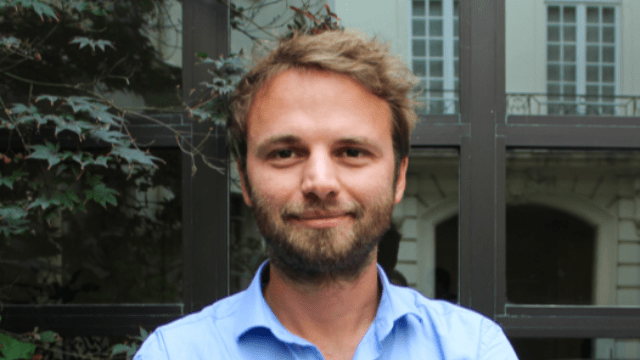Pierre Grateau (E10): ‘Our Sailing Cargos Drastically Reduce Our Environmental Impact’
After developing a start-up in the tech sector, Pierre Grateau (E10) changed course and is launching a fleet of sailing cargos under the Hisseo flag. The company’s aim is to reduce the environmental impact of maritime freight.
ESSEC Alumni: What is the global impact of maritime freight?
Pierre Grateau: Maritime freight represents 90% of goods transport with considerable and often little-known environmental impacts. To begin with, it emits high levels of carbon, 3% of global emissions, which is the equivalent of a country such as Germany, and this proportion could even triple by 2050, according to ADEME [French Agency for Ecological Transition]. There’s a similar issue with fine particles, causing 60,000 premature deaths in port cities, and the risk to biodiversity with water pollution, collisions involving many marine species and sound pollution, which disrupts cetacean communication. Not to mention the often-overlooked social impact: two-thirds of vessels operate under flags of convenience with underpaid sailors.
EA: What solution do you offer to this situation?
P. Grateau: I’m currently launching Hisseo, a maritime transport company which uses modern sailing cargos, a first for the Mediterranean! By using the wind as the main motor, we drastically reduce the impact on climate, fine particles and biodiversity. Right now, this represents the most mature solution to decarbonise freight transport.
EA: Can a sailing cargos offer the same level of performance as a petrol vessel?
P. Grateau: Thanks to the transfer of offshore racing technology (materials, routing and design), sailing cargos achieve good speeds (7.8 knots in our case) and guarantee competitive transit lead times. However, some material constraints (sail sizes in particular) mean that this solution will never rival the load capacity of gigantic container ships. These vessels can carry up to 200,000 tonnes of cargo, whereas our maximum is 100.
EA: In this regard, can sailing cargos really offer a viable solution to reduce the impact of maritime freight?
P. Grateau: As is the case in many other sectors, the transition towards a truly virtuous model must combine cleaner alternatives and efforts in terms of sobriety, which for our sector means reducing the volumes transported, i.e. through the relocation of certain activities.
EA: What development stage has the sailing cargos sector currently reached?
P. Grateau: The sector is booming, as demonstrated by the latest edition of the Wind for Goods fair, which attracted thousands of professionals and citizens, and by the success of operators such as Grain de Sail. The latter has already opened transatlantic routes and has proven its economic viability with major shippers like Biocoop, Hennessy, Ariane or Michelin. More and more companies are realising the benefit of this approach, which allows them to adopt a coherent policy across their whole supply chain and boost their brand image with visible decarbonisation efforts.
EA: What is the outlook for the sector in the coming years?
P. Grateau: Other emblematic projects such as Windcoop are finalising their fundraising, and the number of sailing cargos is set to increase in the years to come! I’m all the more convinced of this given the medium-term risk of an explosion in standard freight costs, due to the combined effects of rising oil prices and emission taxation.
EA: France is a major maritime power. Does such historical importance lend us an advantage in this area?
P. Grateau: Projects are also emerging in Northern European countries and in the USA. The French sector has a real edge nevertheless, thanks to its expertise in both the nautical industry and offshore racing. We still need to ‘convert the try’, however. As is often the case, scaling up will not be achieved without massive private and public investment.
EA: What is your growth strategy in this regard?
P. Grateau: We want to launch the sail transport sector along France’s southern coastline. Our short-term aim is to fund a first vessel (€5M) and test the model on the Mediterranean before creating an entire fleet.
EA: You previously created a company (AssoConnect) in a completely different sector. How did you manage the conversion?
P. Grateau: It’s true I come from the tech sector, which is clearly less ‘physical’! I learn a great deal from my partners, who come from the marine shipping and sailing sectors, and from the experts we have surrounded ourselves with: the famous skipper Francis Joyon and a team of renowned naval architects.
EA: You also opted for the status of a Co-operative Company of Collective Interest. Why this choice?
P. Grateau: We felt that this status, which combines economic ambition and social usefulness, was the most appropriate legal form in terms of present-day concerns. All the stakeholders are represented in its governance, and in particular local authorities and citizens, which enables us to align the interests of all players, a necessary prerequisite if we are to provide an adequate response to this major transition challenge.
Interview by Louis Armengaud Wurmser (E10), Content Manager at ESSEC Alumni
Do you want more quality content about the ESSEC community? Join us now!

Comments0
Please log in to see or add a comment
Suggested Articles




